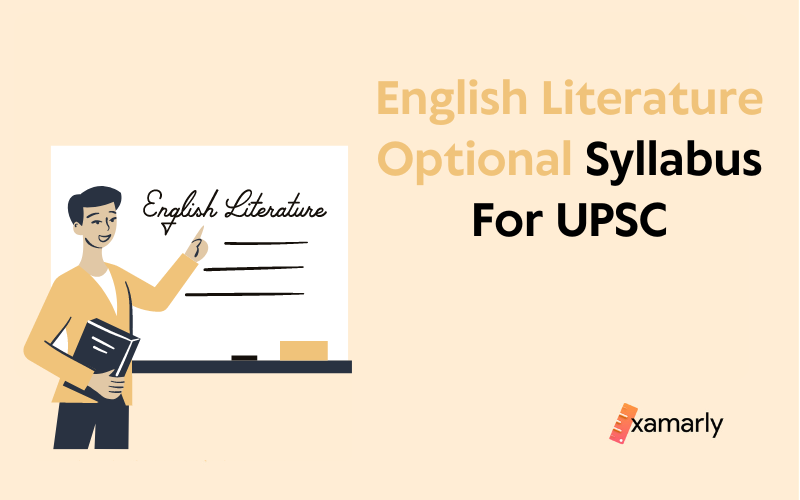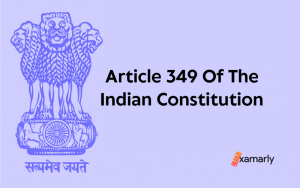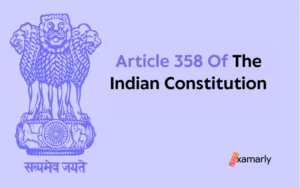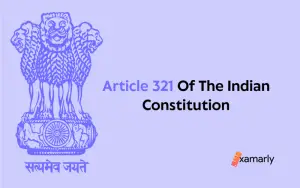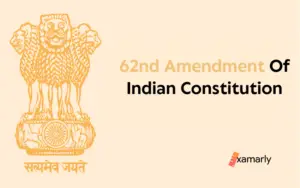Choosing the perfect optional subject is no child’s play. It is very important in determining an aspirant’s ranking in the IAS Exam. Having adequate knowledge of the optional subject along with an interest in the area eases your exam preparation drastically. Recent statistics indicate that the success rate of literature subjects being chosen as optional is increasing with time. Choosing English Literature as your optional exam will be a very wise choice. Why is that so?
Let us briefly look at what the paper comprises and how to prepare for English Literature Optional Syllabus for UPSC.
The civil Services Examination happens in 3 phases: prelims, mains, and an interview round. For the UPSC Civil Services Mains Exam, candidates must select one of the 48 optional subjects. English as an optional subject in the UPSC Civil Services Exam is easier to learn because of already existing exposure to the subject at school or graduate/postgraduate levels. Also, the English language is one of the non-optional language papers. So, there is no way you can run away from the subject. So might as well dig deep into its extensive syllabus and ensure some straightforward marks.
- English Literature Optional Syllabus For UPSC
- UPSC English Literature Optional Syllabus Paper-I: Section A
- UPSC English Literature Optional Syllabus Paper-I: Section B
- UPSC Optional English Literature Syllabus Paper-II: Section A
- UPSC Optional English Literature Syllabus Paper-II: Section B
- Exam Pattern
- English Literature Optional UPSC Syllabus – Preparation Tips
- Important Books To Cover
- Conclusion
- FAQs
English Literature Optional Syllabus For UPSC
UPSC English Literature Optional Syllabus Paper-I: Section A
Below is a list of texts for in-depth study. Candidates must demonstrate that they have sufficient understanding of the following literary trends and movements for an English Literature Optional Paper I.
- Epic and Mock Epic
- Satire
- The Renaissance
- Rise of the Novel
- Metaphysical Poetry
- Romantic Movement
- Neo-classicism
- Elizabethan and Jacobean Drama
- Victorian Age
| Poets | Poems |
|---|---|
| William Shakespeare | King Lear and The Tempest |
| John Donne: The following poems | 1. Death be not proud, 2. The Good Morrow, 3. Canonization, 4. On his Mistress going to bed, 5. The Relic |
| John Milton | Paradise Lost, I, II, IV, IX |
| Alexander Pope | The Rape of the Lock |
| William Wordsworth: The following poems: | 1. Tintern Abbey; 2. Odeon Intimations of Immortality; 3. Three years she grew; Michael; 4. She dwelt among untrodden ways; 5. Independence and Resolution; 6. The World is too much with us; 7. Upon Westminster Bridge; 8. Milton, thou shouldst be living at this hour |
| Alfred Tennyson | In Memoriam |
| Henrik Ibsen | A Doll’s House |
UPSC English Literature Optional Syllabus Paper-I: Section B
| Novelists | Novels |
|---|---|
| Jonathan Swift | Gulliver Travels. |
| Jane Austen | Prejudice and Pride |
| Charles Dickens | Hard Times |
| Henry Fielding | Tom Jones |
| Thomas Hardy | Tess of the d’Urbervilles |
| George Eliot | The Mill on the Floss |
| Mark Twain | The Adventures of Huckleberry Finn |
UPSC Optional English Literature Syllabus Paper-II: Section A
Below is a list of texts for in-depth study. Candidates must demonstrate that they have sufficient understanding of the following literary subjects and movements:
- Indian Writing in English
- Colonialism and Post-Colonialism
- Modernism
- Marxist, Psychoanalytical, and Feminist approaches to literature
- Post-Modernism
- Poets of the Thirties
- Absurd Drama
- The Stream of Consciousness Novel
| Poets | Poems |
|---|---|
| William Butler Yeats: | 1. Easter 1916 2. A Prayer for my daughter 3. The Second Coming 4. Sailing to Byzantium 5. Among School Children 6. The Tower 7. Meru 8. Leda and the Swan 9. Lapis Lazuli |
| T.S. Eliot: | 1. Journey of the Magi 2. Love Song of J.Alfred Prufrock 3. Burnt Norton |
| W.H. Auden: | 1. Musee des Beaux-Arts 2. Petition 3. Partition 4. In Memory of W.B. Yeats 5. The Unknown Citizen 6. Lay your sleeping head, my love 7. The Shield of Achilles 8. Mundus Et Infans 9. Consider 10. September 1, 1939 |
| John Osborne | Look Back in Anger |
| Samuel Beckett | Waiting for Godot |
| Philip Larkin: | 1. Please 2. Next 3. Deceptions 4. Mr. Bleaney 5. Days 6. Afternoons |
| A.K. Ramanujan: | 1. A River 2. Obituary 3. Love Poem for a Wife 1 4. Small-Scale Reflections on a Great House 5. Looking for a Causim on a Swing 6. Of Mothers, among other Things |
UPSC Optional English Literature Syllabus Paper-II: Section B
| Novelist | Novels |
|---|---|
| James Joyce | Portrait of the Artist as a Young Man |
| Joseph Conrad | Lord Jim |
| D.H. Lawrence | Lovers and Sons |
| E.M. Forster | A Passage to India |
| Virginia Woolf | Mrs. Dalloway |
| Raja Rao | Kanthapura |
| V.S. Naipaul | A House for Mr. Biswas |
Exam Pattern
UPSC Mains optional English Literature syllabus consists of two papers. Each of these tests the first-hand and critical reading of texts from different periods in English literature. Paper 1 pertains to the period 1600-1900 while Paper 2 is about 1900-1990. Each paper will have two mandatory questions. The first will deal with a short-note question related to the main study subjects. The second will be a critical examination of an unseen text in both prose and verse. There are 250 marks total on each English optional paper. Each mains English exam lasts three hours. You can score well in English literature if you have carefully thought out techniques.
To know more about UPSC Exam Pattern, visit the linked articles.
English Literature Optional UPSC Syllabus – Preparation Tips
- What to study? – Always begin by glancing at the syllabus and the previous year’s question papers. This will give you a sense of what sort of texts are given more importance and what kind of questions are being asked. Rather than diving deeply into this vast syllabus, concentrate on having a surface knowledge of everything but a deeper knowledge of important areas. For example, you need not know the historical periods by heart. But knowing important plays by Shakespeare or the works of Chaucer becomes crucial.
- How to study? – Note-keeping is a must. After reading each text make a note of the author, year of publishing, important characters, and important literary trends. Read a bit more about the social, economical, and political context of the work. Also, make it a point to compare and learn. Compare with texts by the same author, by different authors belonging to the same period, or by different authors belonging to different periods but exhibiting similar trends. Also, keep an eye out for quotable sentences.
- How to answer? – Make sure to practice writing an answer because it is not as easy as it seems. While beginning, make sure to mention the specific details of the text like the author, year of publishing, main theme, literary period, etc. Further, add interpretation of the events in the text. While concluding, make it a point to add your perspective or unbiased opinion about the text. Also, if possible, cite a quote from the text.
Important Books To Cover
Apart from novels, poems or literary works here is a list of reference textbooks that will help you learn English Optional Subject.
- The Routledge History of Literature in English
- English Literature by William J Long
- Introduction to English Literature by W. H Hudson
- The Concise Oxford Companion to English Literature by Dinah Birch
- A short History of English Literature by Pramod K. Nayar
- An Objective History of English Literature Through Multiple-Choice Questions by Dr. B. B. Jain
- CBSE-UGC-NET-English Guide by H. S. Bhatia
- Trueman’s UGC NET English Literature by B. P. Panigrahi
- UGC NET/SET/JRF/LS English Literature Guide by Arihant
- UGC NET/JRF/SET English Literature by Dr. B. B. Jain
Conclusion
With the right amount of preparation and interest, the syllabus of UPSC English Literature optional subjects will be easy to prepare and thereby making it easier to crack. Do not leave preparing for this subject to the end assuming that it is something you know! English exams at the UPSC level are entirely different from what you have been writing at the graduate or post-graduate level. So study well and be rest assured about a smooth sail.
Relatable Articles:
- How To Write An Essay In UPSC Mains?
- How To Select Optional Subject For UPSC Exam
- How To Prepare For UPSC Exams Without Coaching
- How To Complete UPSC Mains Paper in 3 Hours?
FAQs
Can We Cover The UPSC English Literature Syllabus In 6 months?
This depends solely on your previous knowledge of the subject and your interest in it. An English literature graduate can manage to cover the whole English Literature UPSC optional syllabus within the first three months. However, a candidate who is studying this topic for the first time for UPSC mains should commit to the complete six months to get through the entire UPSC Syllabus.
What Is The Difference Between The UPSC English Optional Syllabus Mains Paper And UPSC English Literature Syllabus?
The UPSC English Literature Syllabus includes The Renaissance, The Mock-epic and the Epic, Neoclassicism, Metaphysical Poetry, Jacobean and Elizabethan Drama, The Romantic Movement, and Satire, whilst the UPSC Mains English Paper includes comprehension, usage, and vocabulary, precis writing, and short essays.


